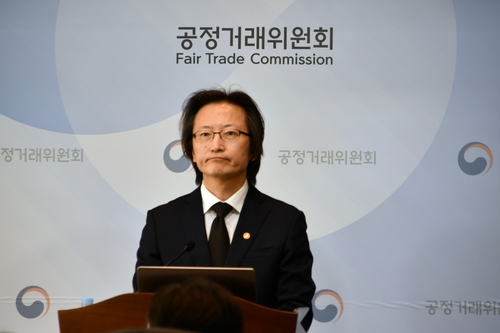(Seoul=Yonhap Infomax) Pil Joong Jeong –

Joo Byung-ki, Chairperson of the Fair Trade Commission (FTC), has emphasized the need for a broad social consensus before considering any relaxation of South Korea’s separation of banking and commerce regulations, a key issue raised by the business community. He underscored the importance of promoting advanced industries while mitigating the risks of economic power concentration.
Cautious Approach to Easing Banking-Industry Separation—FTC to Closely Review Fair Trade Act
At a press briefing held at the FTC’s Seoul headquarters on the 21st, Chair Joo stated, “Given ongoing concerns about the expansion of industrial control through financial institutions and the concentration of economic power, any move to ease the separation of banking and commerce must be approached with caution and based on a social consensus.”
He added, “The most important prerequisite is to ensure investments that will maintain South Korea’s global economic leadership. It is crucial to devise measures that both reduce the negative effects of economic concentration and foster the growth of advanced industries.”
Addressing recent remarks by SK Group Chairman Chey Tae-won questioning the effectiveness of the Fair Trade Act, Joo said, “A lack of effectiveness does not justify abolishing the regulation. We need to review the system more thoroughly and improve areas where necessary to enhance its effectiveness.”
Platform Regulation to Be Addressed Under Existing Laws—‘Fact Sheet’ Principle Affirmed
Joo indicated that regulations on online platforms will be established under current laws, taking into account trade relations with the United States and other countries.
“There are still trade issues that make it difficult to enact a dedicated platform monopoly law,” he said. “However, there are various tools available under existing laws to regulate monopolistic behavior by platforms.”
Regarding the recent Korea-US fact sheet, which states that US companies will not be discriminated against by related regulations, Joo clarified, “The declaration simply affirms the principle that digital laws will not discriminate against US companies. It does not constitute a commitment by Korea to introduce or refrain from introducing such regulations.”
In his opening remarks, Joo also stressed the need to establish a fair platform ecosystem. “To prevent a recurrence of unresolved payment issues, as seen in last summer’s TMON incident, institutional improvements are necessary. With several related bills already submitted to the National Assembly, we will support future legislative discussions,” he said.
On the issue of introducing a cap on platform commissions, which was raised during the National Assembly audit, Joo noted that the system will be improved through special legislation. “Given the diversity of commission structures in online platforms, a general cap is not appropriate. Instead, we plan to introduce targeted special laws, such as for delivery app commissions,” he explained.
On the debate over easing the separation of banking and commerce, Joo reiterated the need to promote advanced industries while addressing the risks of economic power concentration among large conglomerates (chaebol).
Stronger Sanctions and Monitoring for Unfair Practices in Large Business Groups
Joo also highlighted the importance of eradicating unfair internal transactions within large business groups. “We will further strengthen our systems for managing and analyzing information on business groups, enabling closer monitoring of their trends and strategies,” he said. “We will impose tougher sanctions on unfair expansion of control, such as funneling lucrative contracts to owner families during succession processes.”
As part of these efforts, the FTC is preparing to exclude treasury shares when calculating the total number of issued shares for regulations on private interest appropriation. To prevent dual listings of holding companies and their subsidiaries, the mandatory shareholding ratio for holding companies will be set at 50%, while a 30% threshold will apply to listed subsidiaries. However, the 50% requirement will be maintained for newly listed companies.
joongjp@yna.co.kr
(End)
Copyright © Yonhap Infomax Unauthorized reproduction and redistribution prohibited.

